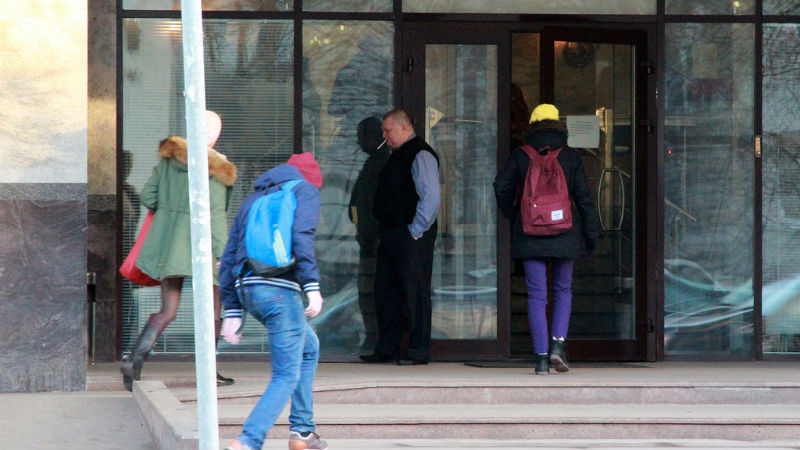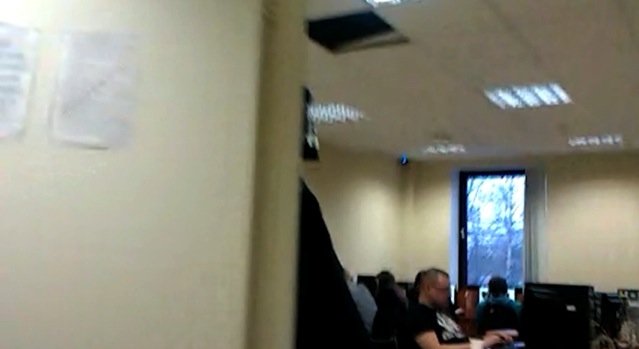
Entrance of the Savushkina, 55 “troll army” headquarters in St. Petersburg. Photo by Moi Region.
It has long been an open [1] secret [2] that an army of paid Russian Internet commenters works out of a sleepy residential neighborhood in northern St. Petersburg. A new report [3] from Moi Region [4] and Novaya Gazeta [5] provides an even more revealing view into the so-called “troll den” that allegedly produces thousands of pro-Kremlin posts and comments every day.
Andrei Soshnikov of the weekly St. Petersburg publication Moi Region secured a collection of documents and an interview from a former employee of the notorious Internet Research Agency, which employs over 400 people in a non-descript building located at 55 Savushkina str [6]. in St. Petersburg.
The interview [3] mostly confirms what many already know about the hundreds of employees who collectively manage thousand of social media accounts on LiveJournal, Twitter, and other platforms. These users produce pro-Kremlin posts, based on prepackaged talking points, and sandwich them between apolitical posts about photography, fashion, sports, and other trivial subjects. Aside from a rare, albeit brief, undercover video [7] of the Internet commenters at work, the most interesting part of Soshnikov’s article is a revealing cache of documents that provides a partial list [8] of LiveJournal accounts operated by employees, along with the talking points [9] provided to employees following the assassination of opposition leader Boris Nemtsov.

A rare glimpse [7] inside the “troll army headquarters” of Savushkina 55. Screencap from a video posted by Andrei Soshnikov to YouTube.
Working as a paid commenter is not as easy as one might think, as the Internet Research Agency has strict and demanding guidelines [10] for fabricated posts.
Общие требования к написанию постов:
– ОБЯЗАТЕЛЬНОЕ использование ключевых слов в заголовке поста (в приоритете ключевики, выделенные жирным шрифтом непосредственно в данном ТЗ),
– ОБЯЗАТЕЛЬНОЕ использование ключевых слов в самом тексте поста,
– ОБЯЗАТЕЛЬНОЕ использование графических изображений или видеороликов, найденных на Youtube, по тематике поста (крайне приветствуется использование картинок, созданных командой Креативного отдела).
– Пост должен содержать не менее 700 символов для дневной смены, и не менее 1000 символов для ночной.
Если пост оформлен с несоблюдением одного из вышеуказанных пунктов, то он не будет засчитан.
General requirements for writing posts:
– MANDATORY use of keywords in the post’s headline (the prioritized keywords are highlighted in bold in this technical specification),
– MANDATORY use of keywords in the body of the post,
– MANDATORY use of graphics/images or videos found on YouTube on the subject of the post (using the images done by the Creative Department is highly welcome)
– A post must contain no less than 700 characters for those working the day shift, and no less than 1000 for those working the night shift.
If a post is non-compliant with the points above, it will not be counted.
Along with these general guidelines, specific talking points and keywords for various subjects—Ukraine, the E.U., the United States, the Russian opposition, etc.—are regularly distributed to the busy staff. The list of “troll”-operated LiveJournal accounts that Soshnikov provides confirms his article’s findings and reveals countless posts that conform to these guidelines.
A typical “sock puppet” account is operated by “Natalya Drozdova,” who has a LiveJournal blog [11] (archive [12]), a Twitter account [13], a Facebook page [14], a Google+ profile [15], and a VK account [16]. Of course, Natalya Drozdova is not real—the accounts are operated by an employee named Tatyana Kazakbayeva, according to Soshnikov’s documents—but “she” is interested in “art, psychology, and all that happens in the world.” Most of Natalya’s posts are unremarkable, such as a post [17] (archive [18]) about Facebook removing the “feeling fat” status, a whole array of Fifty Shades of Grey parodies [19] (archive [20]), and a post [21] (archive [22]) requesting advice after a bizarre conflict with a shopping mall janitor over bringing a baby carriage into the bathroom.
But Natalya also has strong opinions [23] (archive [24]) on allowing Iran to continue its nuclear program and wonders [25] (archive [26]) out loud if the Russian opposition movement murdered Boris Nemtsov as a “sacrifice” to further its own ends. The musings of “Natalya Drozdova” follow the guidelines [27] set out by the Internet Research Agency on February 28, the same day as her post on Nemtsov was published.
Leaked brief [27] from February 28:
Техзадание от 28 февраля: «Основная идея: формируем мнение о том, что украинские деятели могут быть замешаны в смерти российского оппозиционера. < …> Смерть Немцова была неслучайной в условиях достижения минских договоренностей и возможного улучшения сотрудничества Украины и России. Теперь же Россия снова стала страной, к которой Запад проявляет негатив. Это явная провокация, направленная на всплеск недовольства представителей оппозиции, которые начнут призывы к митингам и шествиям с целью свержения власти».
Technical brief from February 28: “Main idea: Form an opinion that Ukrainian officials could be involved in the death of the Russian opposition figure. < ...> Nemtsov's death was not accidental given the conditions of achieving the Minsk accords and possible improvement of cooperation between Ukraine and Russia. Now Russia has once again become the country that the West reacts negatively towards. This is an obvious provocation, aimed at rousing dissatisfaction from the members of the opposition, who will now begin calling for marches and rallies to overthrow the government.”
“Natalya”‘s LiveJournal post [25] on Feb 28:
С утра сижу и читаю про обстоятельства убийства Немцова. И чем дальше, тем больше убеждаюсь: его банально принесли в жертву свои же. То, где он был убит Борис Немцов (у стен Кремля), с кем он в это время находился (модель из Киева Анна Дурицкая), способ убийства (не банальная авто- или даже авиакатастрофа, а огнестрельное ранение), а также то, что сама девушка, несмотря на множество выстрелов, не пострадала, говорит, что это была провокация. Провокация того, чтобы люди вышли на улицы и сотворили у нас в стране революцию ( о том, чем бы это закончилось – отдельный разговор).
Since morning I've been sitting and reading about the circumstances of Nemtsov's death. The further I read the more I am convinced: he was simply sacrificed by his own people. Where he was killed (near the Kremlin walls), who he was with at the time (a model from Kiev, Anna Duritskaya), how he was killed (not a simple car or plane crash, but a bullet wound), and also the fact that the girl herself, regardless of many fired shots, was unharmed, point to it being a provocation. Done to provoke people to go out into the streets and make a revolution in our country (how that would end is a separate conversation).
RuNet expert Anton Nossik, in his comment [28] on the Moi Region story, notes that not all pro-Kremlin comments are paid for, but the fabricated ones are clearly visible, and that means paid trolls have little effect on the audience's political views.
Безусловно, далеко не все провластные комментарии в интернете – проплачены. Среди 70 млн пользователей рунета есть миллионы, кто, например, рад войне на Украине. От их постов и комментариев пахнет реальным нездоровьем, ущербностью, озлобленностью… А вот в записях, оставленных по методичке, живой человек не просматривается.
Certainly, not all pro-government comments on the Internet are paid for. Among the RuNet's 70 million users there are millions who rejoice about the war in Ukraine, for instance. Their posts and comments reek of ill health, of inferiority, of rage… But in the posts composed based on talking points a living human is hard to see.
The propaganda war online has received almost as much press as the real conflict in eastern Ukraine, and Russia seems to possess greater resources on both fronts. Ukraine has recently tried to match the Russian troll army by recruiting its own brigade [29] of Internet commenters to “fight propaganda with facts and evidence.” However, as this new glimpse into the front lines of the online information war shows, the Russian side is greater in size, well-funded, and more disciplined in its construction of a massive echo chamber on the RuNet.